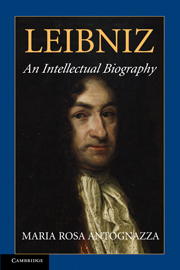Book contents
- Frontmatter
- Dedication
- Contents
- Acknowledgements
- Abbreviations
- Chronological Table
- Introduction
- PART I YOUTHFUL VOCATIONS (1646–1676)
- PART II DREAMS AND REALITY (1676–1716)
- 4 A Universal Genius as Librarian, Historian, and Mining Engineer: Hanover and Lower Saxony (December 1676–October 1687)
- 5 In the Footsteps of the Guelfs: Southern Germany, Austria, and Italy (November 1687–June 1690)
- 6 Back under the Guelf Dukes: Hanover and Wolfenbüttel (June 1690–February 1698)
- 7 Between Brother and Sister: Hanover and Berlin (February 1698–February 1705)
- 8 Light and Shadows: Hanover, Berlin, Wolfenbüttel, Vienna (February 1705–September 1714)
- 9 Epilogue: Last Years in Hanover (September 1714–November 1716)
- Appendix
- References
- Index
8 - Light and Shadows: Hanover, Berlin, Wolfenbüttel, Vienna (February 1705–September 1714)
Published online by Cambridge University Press: 05 September 2014
- Frontmatter
- Dedication
- Contents
- Acknowledgements
- Abbreviations
- Chronological Table
- Introduction
- PART I YOUTHFUL VOCATIONS (1646–1676)
- PART II DREAMS AND REALITY (1676–1716)
- 4 A Universal Genius as Librarian, Historian, and Mining Engineer: Hanover and Lower Saxony (December 1676–October 1687)
- 5 In the Footsteps of the Guelfs: Southern Germany, Austria, and Italy (November 1687–June 1690)
- 6 Back under the Guelf Dukes: Hanover and Wolfenbüttel (June 1690–February 1698)
- 7 Between Brother and Sister: Hanover and Berlin (February 1698–February 1705)
- 8 Light and Shadows: Hanover, Berlin, Wolfenbüttel, Vienna (February 1705–September 1714)
- 9 Epilogue: Last Years in Hanover (September 1714–November 1716)
- Appendix
- References
- Index
Summary
The decade following the demise of Sophie Charlotte was a mixture of successes and defeats. Leibniz – now a well-known savant in the learned circles of European courts – was aging and acquiring a somewhat eccentric appearance. In public, his old-fashioned and flamboyant outfits looked hilarious to Sophie's youngest son, Prince Ernst August, who compared him to the court jester. In private, his still more extravagant attire surprised those ushered into his private quarters: in an attempt to combat gout and arthritis, he donned a fur-lined nightgown, fur stockings, further large socks of grey felt instead of slippers, and a peculiarly long, dark wig. Yet his affability and friendliness won over most. He was a great conversationalist and almost everybody – even the dour Georg Ludwig to some degree – enjoyed his conversation and company, not least because (as the duchess of Orléans pointed out to her aunt, the electress Sophie) he was one of those rare learned men who “were clean, did not stink, and had a sense of humour.”
In these later years in Leibniz's life, a sense of urgency, of needing to finish what he had started, began to grow. Leibniz was in his sixties and sensed that time was short. Once he had gradually recovered from the terrible blow of Sophie Charlotte's death, his philosophical correspondence and intellectual production picked up again. In his correspondence with the Jesuit theologian Bartholomew Des Bosses he revisited the issue of corporeal substances and toyed with the concept of vinculum substantiale; and in correspondence with a bright young German, Christian Wolff, he expounded the metaphysical grounds of dynamical laws and properties and the relation between his ethics and metaphysics.
- Type
- Chapter
- Information
- LeibnizAn Intellectual Biography, pp. 458 - 520Publisher: Cambridge University PressPrint publication year: 2008

